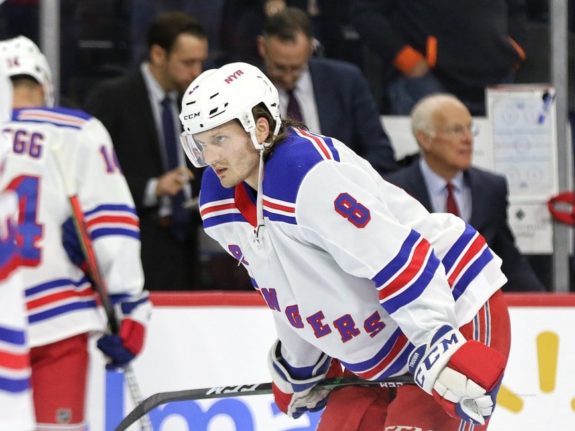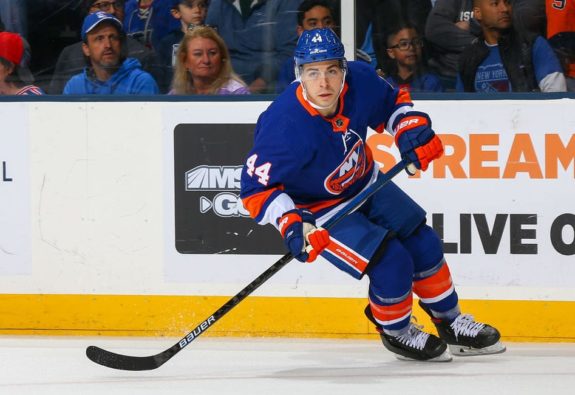
 Matt Rothman
The Hockey Writers
Matt Rothman
The Hockey Writers
41
Reads
0
Comments
NHL Needs to Review Questionable Hits and Calls in Real-Time
Whether the hit by New York Rangers’ Jacob Trouba on New York Islanders’ Michael Dal Colle was legal, the NHL policy, or lack thereof, on illegal hits should be reviewed during the offseason. In what was a thrilling game between two cross-town rivals on Tuesday, a questionable hit became the storyline of the night.
Questionable Hits
In every other contact sport, when there is a questionable hit, the officials can review the play. For example, in college football, officials review every play in which targeting has potentially occurred. If it is decided that targeting did, in fact, occur, the player who committed the foul is disqualified for the remainder of the game and his team is penalized 15 yards.
Related: What Islanders’ Belmont Arena Can Learn From Western Arenas
Now, hockey is a hard game to officiate, and referees have to instantaneously make decisions on potential illegal hits. As a result, they should be allowed to take a second look or have officials in Toronto make the ruling. Looking at the Trouba hit, the veteran defenseman made initial contact with Dal Colle’s head, although Trouba can argue that the Islanders forward had his head down. Regardless, there was head contact and Dal Colle left the game with an injury, and no penalty was assessed. It also resulted in Dal Colle’s teammate, Jean-Gabriel Pageau, stepping in and fighting Trouba in an effort to defend Dal Colle. The result: Trouba and Pageau both received five-minute fighting majors, plus Pageau got a two-minute instigator penalty and 10-minute game misconduct, giving the Rangers a two-minute power play.

If the Department of Player Safety looked at the hit the next day and deemed the check was worthy of a suspension, there is no way of going back and changing the initial ruling. There should be a way in which the officials in Toronto can call in and stop play. It is similar to what happens when a team scores a goal that is missed by the on-ice officials. The scoreboard operator presses the horn to stop play, the play is reviewed, and they pick up play from that previous point.
Replay is increasingly used in the NHL, with the ability to review an offside or goaltending interference within games. However, the league has yet to expand its use to reviewing hits. Whether fans agree with the NHL’s decision not to discipline Trouba, the Islanders can’t benefit from any further discipline to the player.
Related: Islanders Going All-In With Pageau Trade
Head coach Barry Trotz was not happy postgame as he felt Trouba made initial contact with the head.
“The first contact was at the head,” Trotz said. “He was vulnerable, so that [is] some of the red flags. The league looks at it, but my initial look at it was a head-shot. Sometimes it is not intentional, but the first contact was the head.”
@NYIslanders
17 Minute Penalties
The NHL, which makes every attempt for fights not to take place, is also penalizing a player for protecting his teammate for 17 minutes – two minutes for instigating, a five-minute major for fighting, and 10-minute misconduct after fighting. In this case, it was Pageau who earned the 17 minutes worth of penalties.
However, when two players plan a staged fight, they are only being disciplined for five minutes. Generally, all the staged fights come from enforcers around the league who get minimum ice-time on the fourth line. For the Islanders, this player has been Ross Johnston.

The NHL needs to address that area and look for what is better for the game. While many like to see enforcers fighting right off the faceoff to energize the crowd, those fights are not suitable for the game and should be penalized more than someone protecting their teammate. In those situations, the 2-5-10 rule is much more effective and will limit the staged scraps a bit. Many times when there is a major penalty for a hit, which there wasn’t in the case of Trouba and Dal Colle, teams are not even getting the full five-minute advantage because of the instigating infraction that eliminates two minutes. Had Trouba received a major penalty for his hit, the Islanders wouldn’t have received the full five-minute power play due to Pageau’s instigator penalty.
Players should have the right to defend teammates when they’re the recipient of a questionable hit, as Pageau did for Dal Colle. Unfortunately, the NHL feels differently. Rule 56 states, a player who is deemed to be the instigator of an altercation shall be assessed an instigating minor penalty, a major for fighting and a ten-minute misconduct. It is my view that the on-ice officials and the off-ice officials in Toronto should have the ability to overrule the instigator penalty in situations where a player is defending his teammate.
Solution to the Problem
All of this work would need to be done during the offseason. It takes away from a great sport when we see some of the league’s best players miss substantial time for protecting their teammate after a hit. Even if it slows up the game for a couple of minutes, the league would be protecting its players and disciplining those that deserve it.
Fighting will and always should be a part of the game. It is the only sport where players can fight and get back into the game shortly after, but it seems like the 17-minute penalty is too common.
The post NHL Needs to Review Questionable Hits and Calls in Real-Time appeared first on The Hockey Writers.
Popular Articles

















































 Blackhawks Chicago
Blackhawks Chicago Panthers Florida
Panthers Florida Penguins Pittsburgh
Penguins Pittsburgh Rangers New York
Rangers New York Avalanche Colorado
Avalanche Colorado Kings Los Angeles
Kings Los Angeles Maple Leafs Toronto
Maple Leafs Toronto Bruins Boston
Bruins Boston Capitals Washington
Capitals Washington Flames Calgary
Flames Calgary Oilers Edmonton
Oilers Edmonton Golden Knights Vegas
Golden Knights Vegas Flyers Philadelphia
Flyers Philadelphia Senators Ottawa
Senators Ottawa Lightning Tampa Bay
Lightning Tampa Bay Red Wings Detroit
Red Wings Detroit Islanders New York
Islanders New York Sabres Buffalo
Sabres Buffalo Devils New Jersey
Devils New Jersey Hurricanes Carolina
Hurricanes Carolina Stars Dallas
Stars Dallas Jets Winnipeg
Jets Winnipeg Blue Jackets Columbus
Blue Jackets Columbus Predators Nashville
Predators Nashville Wild Minnesota
Wild Minnesota Blues St. Louis
Blues St. Louis Mammoth Utah
Mammoth Utah Ducks Anaheim
Ducks Anaheim Sharks San Jose
Sharks San Jose Canucks Vancouver
Canucks Vancouver






